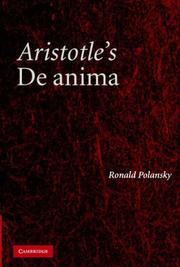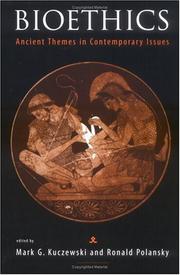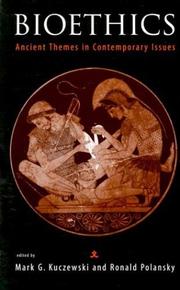| Listing 1 - 10 of 11 | << page >> |
Sort by
|
Book
ISBN: 9780521122733 9780521192767 0521122732 0521192765 9781139022484 Year: 2014 Publisher: New York, N.Y. Cambridge University Press
Abstract | Keywords | Export | Availability | Bookmark
 Loading...
Loading...Choose an application
- Reference Manager
- EndNote
- RefWorks (Direct export to RefWorks)
Aristotle's Nicomachean Ethics is the first and arguably most important treatise on ethics in Western philosophy. It remains to this day a compelling reflection on the best sort of human life and continues to inspire contemporary thought and debate. This Cambridge Companion includes twenty essays by leading scholars of Aristotle and ancient philosophy that cover the major issues of this foundational text. The essays in this volume shed light on Aristotle's rigorous and challenging thinking on questions such as: Can there be a practical science of ethics? What is happiness? Can we arrive at convincing accounts of virtues? Are we responsible for our character? How does moral virtue relate to good thinking? Can we act against our reasoned choice? What is friendship? Is the contemplative life the highest kind of life?
Aristotle --- Ethics. --- Morale --- Aristotle. --- Morale antique --- Aristote, --- Critique et interprétation --- Aristote --- Morale. --- Critique et interprétation. --- Morale antique.
Book
ISBN: 9783111243832 Year: 2024 Publisher: Berlin Boston
Abstract | Keywords | Export | Availability | Bookmark
 Loading...
Loading...Choose an application
- Reference Manager
- EndNote
- RefWorks (Direct export to RefWorks)

ISBN: 9780521862745 0521862744 9780511551017 9780521148856 9780511480287 0511480288 1282001140 9781282001145 1107178088 0511477082 0511551010 0511475632 0511478607 0521148855 Year: 2007 Publisher: New York : Cambridge University Press,
Abstract | Keywords | Export | Availability | Bookmark
 Loading...
Loading...Choose an application
- Reference Manager
- EndNote
- RefWorks (Direct export to RefWorks)
Aristotle's De Anima is the first systematic philosophical account of the soul, which serves to explain the functioning of all mortal living things. In his commentary, Ronald Polansky argues that the work is far more structured and systematic than previously supposed. He contends that Aristotle seeks a comprehensive understanding of the soul and its faculties. By closely tracing the unfolding of the many-layered argumentation and the way Aristotle fits his inquiry meticulously within his scheme of the sciences, Polansky answers questions relating to the general definition of soul and the treatment of each of the soul's principal capacities: nutrition, sense perception, phantasia, intellect, and locomotion. The commentary sheds light on every section of the De Anima and the work as a unit. It offers a challenge to earlier and current interpretations of the relevance and meaning of Aristotle's highly influential treatise.
Psychology. --- Philosophy of mind --- Soul. --- Psychologie --- Philosophie de l'esprit --- Ame --- Aristotle. --- Philosophy of mind. --- Psychology --- Soul --- Pneuma --- Future life --- Philosophical anthropology --- Theological anthropology --- Animism --- Spirit --- Behavioral sciences --- Mental philosophy --- Mind --- Science, Mental --- Human biology --- Philosophy --- Mental health --- Mind, Philosophy of --- Mind, Theory of --- Theory of mind --- Cognitive science --- Metaphysics --- Aristotle --- Arts and Humanities --- History --- Aristotle. - De anima.
Book
ISBN: 0838752152 9780838752159 Year: 1992 Publisher: Lewisburg Bucknell university press
Abstract | Keywords | Export | Availability | Bookmark
 Loading...
Loading...Choose an application
- Reference Manager
- EndNote
- RefWorks (Direct export to RefWorks)
Plato --- #GROL:SEMI-1-05'-04' Plat --- Aflāṭūn --- Aplaton --- Bolatu --- Platon, --- Platonas --- Platone --- Po-la-tʻu --- Pʻŭllatʻo --- Pʻŭllatʻon --- Pʻuratʻon --- Πλάτων --- אפלטון --- פלאטא --- פלאטאן --- פלאטו --- أفلاطون --- 柏拉圖 --- 플라톤 --- Plato. --- Plato - Theaetetus
Book
ISBN: 1139984470 113998909X 1139022482 Year: 2014 Publisher: Cambridge : Cambridge University Press,
Abstract | Keywords | Export | Availability | Bookmark
 Loading...
Loading...Choose an application
- Reference Manager
- EndNote
- RefWorks (Direct export to RefWorks)
Aristotle's Nicomachean Ethics is the first and arguably most important treatise on ethics in Western philosophy. It remains to this day a compelling reflection on the best sort of human life and continues to inspire contemporary thought and debate. This Cambridge Companion includes twenty essays by leading scholars of Aristotle and ancient philosophy that cover the major issues of this text. The essays in this volume shed light on Aristotle's rigorous and challenging thinking on questions such as: can there be a practical science of ethics? What is happiness? Are we responsible for our character? How does moral virtue relate to good thinking? Can we act against our reasoned choice? What is friendship? Is the contemplative life the highest kind of life? Covering all sections of the Nicomachean Ethics and selected topics in Aristotle's Eudemian Ethics and Protrepticus, this volume offers the reader a solid foundation in Aristotle's ethical philosophy.

ISBN: 026211254X Year: 2000 Publisher: Cambridge The MIT Press
Abstract | Keywords | Export | Availability | Bookmark
 Loading...
Loading...Choose an application
- Reference Manager
- EndNote
- RefWorks (Direct export to RefWorks)
In recent years, bioethicists have worked on government commissions, on ethics committees in hospitals and nursing homes, and as bedside consultants. Because ethical knowledge is based on experience within the field rather than on universal theoretical propositions, it is open to criticism for its lack of theoretical foundation. Once in the clinic, however, ethicists noted the extent to which medical practice itself combined the certitudes of science with craft forms of knowledge. In an effort to forge a middle path between pure science and applied medical and ethical knowledge, bioethicists turned to the work of classical philosophy, especially the theme of a practical wisdom that entails a variable knowledge of particulars.In this book contemporary bioethicists and scholars of ancient philosophy explore the import of classical ethics on such pressing bioethical concerns as managed care, euthanasia, suicide, and abortion. Although the contributors write within the limits of their own disciplines, through cross references and counterarguments they engage in fruitful dialogue.
Medical ethics. --- Medicine, Greek and Roman. --- Philosophy, Ancient. --- Medical ethics --- Medicine, Greek and Roman --- Philosophy, Ancient --- Ancient philosophy --- Greek philosophy --- Philosophy, Greek --- Philosophy, Roman --- Roman philosophy --- Greek medicine --- Medicine, Roman --- Medicine, Unani --- Roman medicine --- Tibb (Medicine) --- Unani medicine --- Unani-Tibb (Medicine) --- Medicine, Ancient --- Biomedical ethics --- Clinical ethics --- Ethics, Medical --- Health care ethics --- Medical care --- Medicine --- Bioethics --- Professional ethics --- Nursing ethics --- Social medicine --- Moral and ethical aspects

ISBN: 0262611775 9780262611770 Year: 2002 Publisher: Cambridge (Mass.): MIT press
Abstract | Keywords | Export | Availability | Bookmark
 Loading...
Loading...Choose an application
- Reference Manager
- EndNote
- RefWorks (Direct export to RefWorks)
Book
ISSN: 00791687 ISBN: 9789004329584 9004329587 9004340084 Year: 2017 Volume: 146 Publisher: Leiden ; Boston : Brill,
Abstract | Keywords | Export | Availability | Bookmark
 Loading...
Loading...Choose an application
- Reference Manager
- EndNote
- RefWorks (Direct export to RefWorks)
Reading Aristotle argues that Aristotle's treatises must be approached as progressive unfoldings of a unified position that may extend over a single book, an entire treatise, or across several works. Contributors demonstrate that Aristotle relies on both explanatory and expository principles. Explanatory principles include familiar doctrines such as the four causes, actualitys priority over potentiality, and nature?s doing nothing in vain. Expository principles are at least as important. They pertain to proper sequence, pedagogical method, the role of reputable views and the opinions of predecessors, the equivocity of key explanatory terms, and the need scrupulously to observe distinctions between the different sciences. A sensitivity to expository principles is crucial to understanding both particular arguments and entire treatises.
Explanation. --- Exposition (Rhetoric) --- Explication --- Aristotle. --- Aristotle --- Knowledge --- Rhetoric. --- Rhetoric, Ancient --- Greek language --- Rhétorique ancienne --- Grec (Langue) --- Rhetoric --- Rhétorique --- Aristotelismus. --- Exposition (Rhetoric). --- Aristoteles, --- Explanation --- Rhetoric, Ancient. --- Rhétorique ancienne --- Rhétorique --- Aristote, --- Critique et interprétation --- Aristote --- Critique et interprétation. --- Aristoteles --- Arisṭāṭṭil --- Aristo, --- Aristotel --- Aristotele --- Aristóteles, --- Aristòtil --- Aristotile --- Arisṭū --- Arisṭūṭālīs --- Arisutoteresu --- Arystoteles --- Ya-li-shih-to-te --- Ya-li-ssu-to-te --- Yalishiduode --- Yalisiduode --- Ἀριστοτέλης --- Αριστοτέλης --- Аристотел --- ארסטו --- אריםטו --- אריסטו --- אריסטוטלס --- אריסטוטלוס --- אריסטוטליס --- أرسطاطاليس --- أرسططاليس --- أرسطو --- أرسطوطالس --- أرسطوطاليس --- ابن رشد --- اريسطو --- Pseudo Aristotele --- Pseudo-Aristotle --- アリストテレス --- Aristotle. - Rhetoric --- Critique et interprétation.
Digital

ISBN: 9780271032214 Year: 2021 Publisher: University Park, Pa Penn State University Press
Abstract | Keywords | Export | Availability | Bookmark
 Loading...
Loading...Choose an application
- Reference Manager
- EndNote
- RefWorks (Direct export to RefWorks)
Book

ISBN: 9781463222468 Year: 2009 Publisher: Piscataway, NJ
Abstract | Keywords | Export | Availability | Bookmark
 Loading...
Loading...Choose an application
- Reference Manager
- EndNote
- RefWorks (Direct export to RefWorks)
| Listing 1 - 10 of 11 | << page >> |
Sort by
|

 Search
Search Feedback
Feedback About UniCat
About UniCat  Help
Help News
News